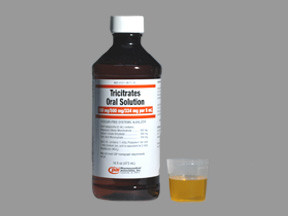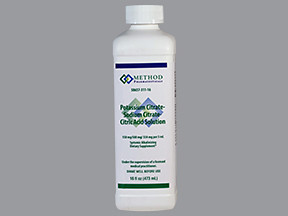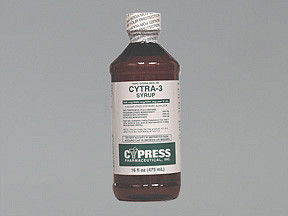CITRIC ACID/POTASSIUM-SODIUM CITRATES - ORAL
PHONETIC PRONUNCIATION: (SIT-rick/poh-TASS-ee-um, SO-dee-um SYE-trates)
COMMON BRAND NAME(S): Cytra-3, Polycitra
GENERIC NAME(S): sodium/potassium/potassium citrate/sodium citrate/cit ac
Uses
USES: This medication is used to make the urine less acidic. Urine that is less acidic helps the kidneys get rid of uric acid, helping to prevent gout and certain types of kidney stones (urate). This medication can also prevent and treat certain metabolic problems (acidosis) caused by kidney disease. Citric acid and citrate salts (which contain potassium and sodium) belong to a class of drugs known as urinary alkalinizers. Because some conditions require you to limit your intake of potassium and sodium, your doctor's choice of product may depend on how much potassium and sodium you can take.
How to use CITRIC ACID/POTASSIUM-SODIUM CITRATES - ORAL
HOW TO USE: Take this medication by mouth, usually 4 times a day or as directed by your doctor. To help prevent diarrhea, take each dose after a meal. To prevent stomach upset, mix your prescribed dose of medication in a full glass (4 to 8 ounces or 120 to 240 milliliters) of cold water or juice just before taking, or take as directed by your doctor. Drink the entire mixture slowly. If you still have stomach upset, mixing your dose in a larger amount of liquid may help unless your doctor directs you otherwise. Ask your doctor or pharmacist for further instructions. Dosage is based on your medical condition and response to treatment. Carefully measure the dose using a special measuring device/spoon. Do not use a household spoon because you may not get the correct dose. The liquid form of this medication must be mixed with at least 4 ounces (120 milliliters) of water or juice before taking. Refrigerating the mixture before drinking may improve the taste. Drink more water or juice after taking this medication unless otherwise directed by your doctor. Take this medication as prescribed. Do not increase your dose or take this more often without your doctor's approval. Use this medication regularly to get the most benefit from it. To help you remember, take it at the same times each day. While taking this medication, you may need to test the pH (acidity) of your urine using special paper. The pH will help determine the proper dose. Consult your doctor or pharmacist for more information.
Side Effects
Precautions
Interactions
Overdose
Images
Reviews
Faq for CITRIC ACID/POTASSIUM-SODIUM CITRATES - ORAL
- This medication is primarily used to treat urinary tract infections and kidney stones by making urine less acidic and reducing the formation of certain types of kidney stones. It is also used as a urinary alkalizer.
- It is usually taken orally with plenty of water or as directed by your doctor. Follow the dosage instructions on your prescription label. Take this medication at evenly spaced intervals to maintain a constant level in your body.
- Common side effects may include stomach upset, diarrhea, and increased urination. If you experience any severe side effects such as difficulty breathing, chest pain, or swelling of the face, lips, tongue, or throat, seek immediate medical attention.
- It is important to inform your doctor about all the medications you are currently taking, including prescription, over-the-counter, and herbal products. Certain medications may interact with citric acid/potassium-sodium citrates, so it is essential to discuss it with your healthcare provider.
- The effects of this medication may vary from person to person. It typically takes a few days to a few weeks for citric acid/potassium-sodium citrates to start showing its full therapeutic benefits. Follow your doctor's instructions and continue taking the medication as prescribed.
- It is important to consult with your doctor before taking this medication if you are pregnant or breastfeeding. Your doctor will evaluate the potential risks and benefits and determine whether it is safe for you and your baby.
- If you miss a dose, take it as soon as you remember. However, if it is close to your next scheduled dose, skip the missed dose and continue with your regular dosing schedule. Do not double the dose to make up for the missed one.
- It is generally recommended to avoid or limit alcohol consumption while taking this medication. Alcohol can increase the acidity of urine, potentially counteracting the effects of citric acid/potassium-sodium citrates.
- Store this medication at room temperature, away from moisture and heat. Keep it out of reach of children and pets. Do not use the medication if it has expired or if the packaging is damaged.
Disclaimer
IMPORTANT: HOW TO USE THIS INFORMATION: This is a summary and does NOT have all possible information about this product. This information does not assure that this product is safe, effective, or appropriate for you. This information is not individual medical advice and does not substitute for the advice of your health care professional. Always ask your health care professional for complete information about this product and your specific health needs.




No Reviews Yet